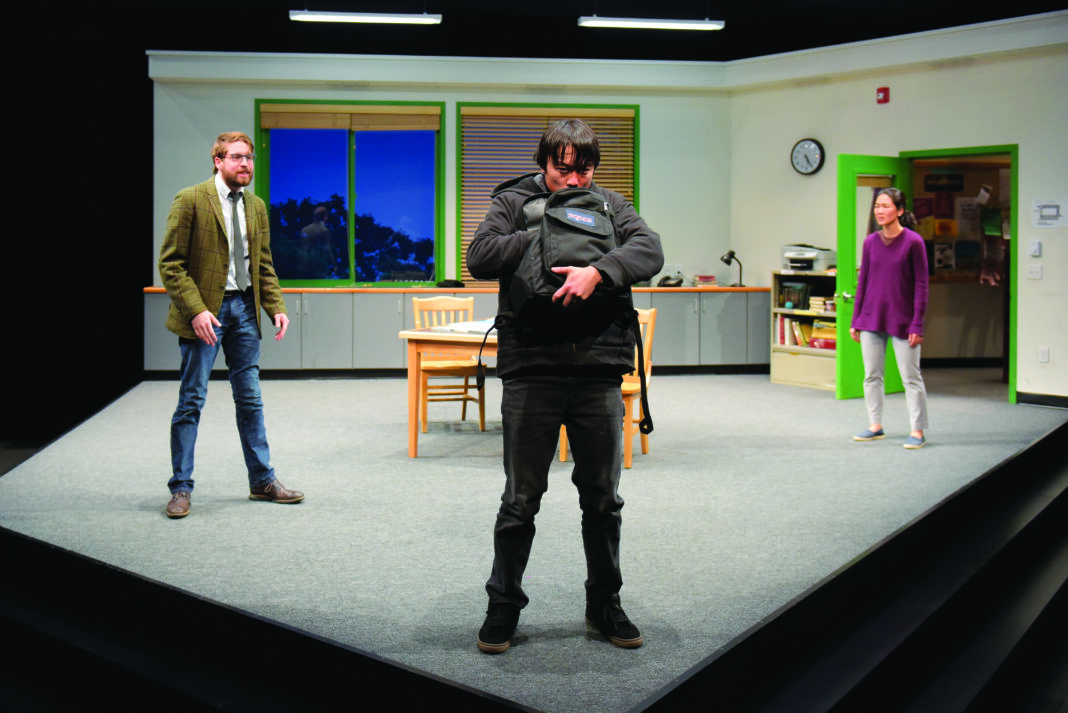In case you haven’t noticed, we are being bombarded daily with increasingly urgent warnings that “civilization” as we know it—meaning the nation/state and all of the cultural, political and economic achievements the term embodies—is nearing an existential crisis. The remedies remain frustratingly unknown.
Reduced to a minimalist level, that’s the problem audiences face in Office Hour, Julia Cho’s gripping probe into the gun violence currently disturbing America’s schools and colleges. The play, a co-production between Berkeley Repertory Theatre (BRT) and New Haven, Connecticut’s Long Wharf Theatre, is on BRT’s stage through Sunday, March 25.
On an unidentified college campus, three teachers of creative writing—David (Jeremy Kahn), Genevieve (Kerry Warren) and Gina (Jackie Chung)—gather between classes in the latter’s stark office-turned-meeting room (scenic design by Matt Saunders). The topic up for discussion is what to do about a student named Dennis (Daniel Chung; no surnames are supplied for any of the characters), who has been dressing and acting strangely, while submitting writing assignments filled with violence and graphic sex, which make his fellow students uncomfortable when read aloud. Gina has been forced to consider giving him a failing grade.
David and Genevieve are tenured faculty members who have been through the classroom cultural wars over a long period and are hardened by the experience. Also, they are both white, while younger Gina is, like her student Dennis, of Asian descent. As an adjunct lecturer with no job security, she is low on the academic totem pole, so naturally the task of dealing with Dennis is placed squarely on her shoulders.
Although it has a disturbingly pedantic ring that clashes with ensuing events, Cho’s play turns on the dynamics revealed in this introductory scene. David points out that Dennis fits the profile of a “classic shooter.” He is an egocentric loner who exults in a delusional conviction that he is superior to his colleagues and instructors. He is obsessed by violence and sex. What’s more, he’s dangerous. With no record of mental illness or criminal activity, he could easily buy an assault rifle at any sporting goods store.
David’s recommendation, generally supported by Genevieve: Get rid of the guy! Flunk him out NOW, before it’s too late! Her colleagues’ brusque stereotyping disturbs Gina. Despite the warning signs, she detects a spark of creativity in some of Dennis’ work, and senses that she might be able to break through his self-destructive behaviors. The bulk of the roughly 85-minute, intermission-less drama is devoted to exploring the validity of these competing positions.
In his first meeting with Gina, Dennis, dressed all in black, his face obscured by a hoodie, dark glasses and a baseball cap, is a menacing figure—especially since his carefully protected backpack may contain a weapon. Stubbornly unresponsive to Gina’s suggestion that he sit down and join her in discussing his academic problems, he threatens her with violence when she attempts to search the backpack. Gradually, however, the two recognize similarities in their lives, barriers begin to crumble and we are left with imagined alternative conclusions about how the relationship might ultimately turn out.
This ending begs the question of how to prevent school violence. With strict defensive measures that recognize potential dangers early on and deal decisively with them? By using “tough love” to redirect potential offenders? By using mental-health techniques to work through the psychological barriers? Putting the ball in the audience’s court has the virtue of recognizing that we don’t have any definitive answers, yet have to keep trying.
Office Hour is an important and timely play by a promising young writer. The production, anchored by director Lisa Peterson and featuring a pair of accomplished actors in the leading roles, is solid throughout. Not everything is tied up neatly, but isn’t that the way life is?
NOW PLAYING: Office Hour runs through March 25 at the Berkeley Repertory Theatre, 2025 Addison St., Berkeley; 510/647-2949; berkeleyrep.org.






